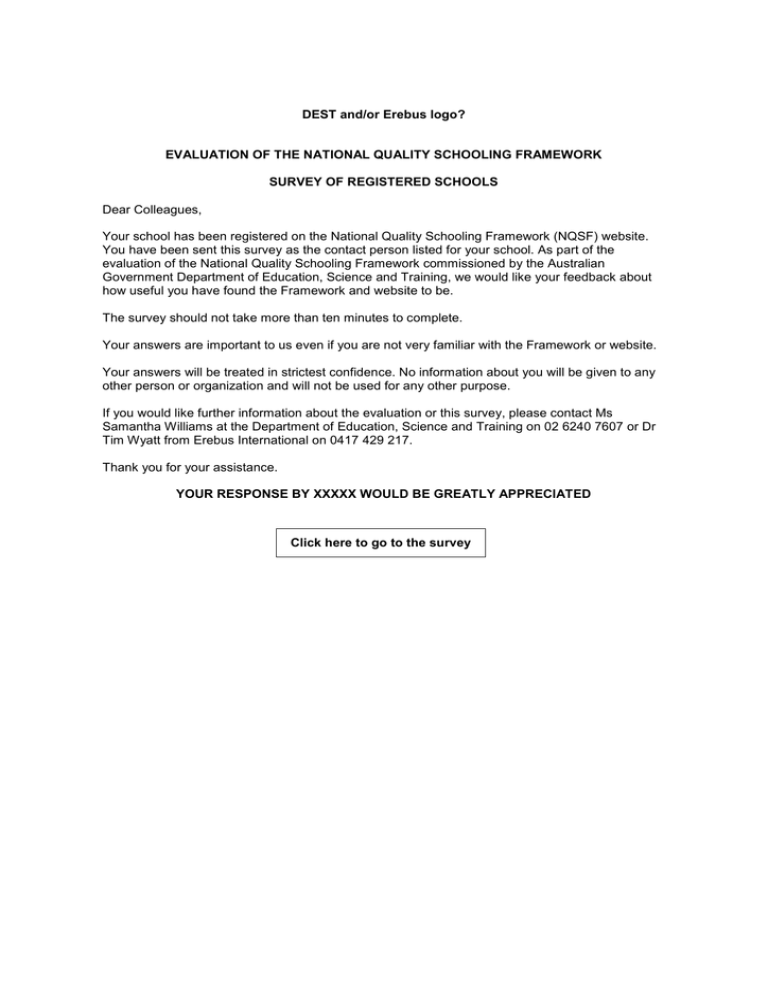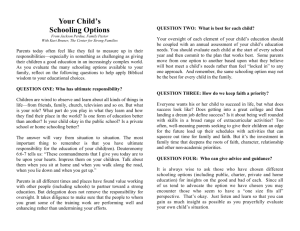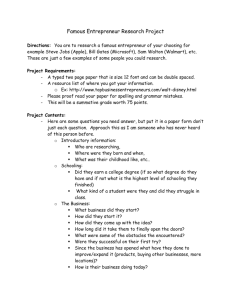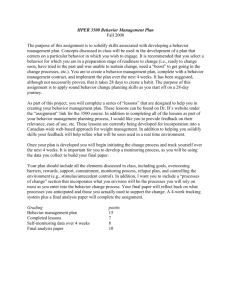Online USer Questionnaire.doc
advertisement

DEST and/or Erebus logo? EVALUATION OF THE NATIONAL QUALITY SCHOOLING FRAMEWORK SURVEY OF REGISTERED SCHOOLS Dear Colleagues, Your school has been registered on the National Quality Schooling Framework (NQSF) website. You have been sent this survey as the contact person listed for your school. As part of the evaluation of the National Quality Schooling Framework commissioned by the Australian Government Department of Education, Science and Training, we would like your feedback about how useful you have found the Framework and website to be. The survey should not take more than ten minutes to complete. Your answers are important to us even if you are not very familiar with the Framework or website. Your answers will be treated in strictest confidence. No information about you will be given to any other person or organization and will not be used for any other purpose. If you would like further information about the evaluation or this survey, please contact Ms Samantha Williams at the Department of Education, Science and Training on 02 6240 7607 or Dr Tim Wyatt from Erebus International on 0417 429 217. Thank you for your assistance. YOUR RESPONSE BY XXXXX WOULD BE GREATLY APPRECIATED Click here to go to the survey EVALUATION OF THE NATIONAL QUALITY SCHOOLING FRAMEWORK Instructions for completing the survey You may complete this survey in one of two ways. You may download a copy of the survey by clicking here, print it, and return to Erebus International by fax to 02 98163633 or by mail to Suite 31/1-7 Jordan St, Gladesville, NSW, 2111 Or you may complete the survey on-line. You will need to be connected to the internet to do this. If you choose this option, you will need to complete the survey at one sitting. You will not be able to save the survey and come back to it at another time. Completing the survey should not take more than about ten minutes. Proceed to the survey on-line About your school 1. Where is your school located? Metropolitan area Regional centre Rural area Remote area 2. State/Territory NSW Queensland Victoria ACT Tasmania Northern Territory South Australia Western Australia 3. What grades or year levels are currently taught in your school? (Please mark which ever apply) 4. Is this a Pre-school Lower Primary Middle Primary Upper Primary Lower Secondary Middle Secondary Upper Secondary Other a). Government school b). Catholic School c). Independent school d). Other About you 5. Which of the following best describes your current role? Principal Executive staff /Head Teacher Classroom teacher Teacher Librarian Other About the National Quality Schooling Framework Not at all Not very familiar Somewhat familiar Very familiar Don’t know 6. How familiar are you with the National Quality Schools Framework? 7. How familiar are you with the NQSF website? 8. How familiar are you with the NQSF Self-Reflection Tools No-one else is familiar Very few are familiar Some are familiar Most are familiar Don’t Know Not at all Little extent Moderate extent Great extent Don’t know 9. How familiar do you think other teachers in your school are with the National Quality Schools Framework? 10. How familiar do you think other teachers in your school are with the NQSF website? 11. How familiar do you think other teachers in your school are with the NQSF Self-Reflection Tools 12. To what extent has the NQSF material been used to help plan and implement school improvement initiatives in your school? 13. How did you find out about the National Quality Schools Framework? (Please mark all that apply) a). through the Boys Education Lighthouse Schools Project b). through the Australian Awards for Quality Schooling c). through an article in a professional journal or newsletter d). by word of mouth from a colleague within my school e). professional association meeting f). by word of mouth from another person, such as a consultant g). by using an internet search engine such as “Google”or “Yahoo” h). by following a link on another web page? i). Other 14. How did you find out about the National Quality Schools Framework website? (Please mark all that apply) a). through the Boys Education Lighthouse Schools Project b). through the Australian Awards for Quality Schooling c). through an article in a professional journal or newsletter d). by word of mouth from a colleague within my school e). professional association meeting e). by word of mouth from another person, such as a consultant f). by using an internet search engine such as “Google”or “Yahoo” g). by following a link on another web page? h). Other 15. How often have you used the NQSF website? a). Once, out of interest b). Once, for a specific purpose c). 2-5 times d). 5-10 times e). More than 11 times 16. Has the NQSF been introduced to other teachers in your school? (Please mark all that apply) a). No b). Yes, in discussions with colleagues c). Yes, in a grade or faculty meeting d). Yes, in a whole school staff meeting e). Other, please describe f). Don’t know a).To download reporting templates for the Boys Education Lighthouse project b). To apply for a National Quality Schools Award c). To find more information about the NQS Framework d). To find tools to help my school improvement initiatives e). To look for reports from other schools about their improvement projects f). General interest g). Other (please describe) a) Not used b). Information about the school improvement model c). The framework d). The tools e). The reports from other schools f). Opportunity to specifically requested tools g). Networking opportunities 17. What were the main reasons why you registered on the NQSF website? (Please mark all that apply) 18. If the NQSF has been used for school improvement, what were the most useful features? (Please mark all that apply) h). Other (please specify) 19. If the NQSF has been used for school improvement, what were the least useful features? (Please mark all that apply) 20. Is your school improvement/ development planning conducted: a) Not used b). Information about the school improvement model c). The framework d). The tools e). The reports from other schools f). Opportunity to specifically requested tools g). Networking opportunities h). Other (please specify) a). on an as needed basis b). on a regular cycle c). Other 21. How frequently does your planning involve. Never Seldom Sometimes Frequently Very frequently a). whole school initiatives b). Initiatives relevant to particular grade level/stages c). particular learning areas d. specific activities e). Other 22. What other sources do you usually turn to for information to help school improvement and school development? (Please mark all that apply) Colleagues in the school Colleagues in other schools Professional associations Education system consultants and advisors Other external consultants and advisors Literature sources Specific internet sites A search of the internet for relevant material Other (please describe) a). Analysis by staff of student outcomes data b). Introduction of new Curriculum and syllabus documents c). Discussions amongst staff based on their observations and perceptions d). Formal surveys of staff, parents or students e). Suggestions or recommendations made as part of a regular review cycle f). Decisions made by school leaders g). Suggestions or recommendations made by education system staff such as School Development Officers, District Superintendents etc. h). Other (Please describe) a). b). c). d). e). f). g). h). i). 23. How are areas for improvement or development usually identified in your school? (Please mark all that apply) 24. How would you rate the following aspects of the NQSF website? a). b). c). d). Ease of access, e.g. speed of downloading Ease of navigating around the website Ease of the registration process Links to practice provided by the website information e). Ease of adapting the Framework to school use f). Ease of use of the self reflection tool g). Relevance of the framework to school management planning h). Relevance of the material to your school’s needs. i) appearance of the website 25. What do you think would be needed for the NQSF to have relevance for improvement/development planning in your school? (Please mark which ever apply) Poor Fair Good Excellent Don’t Know a). It is not likely to have any relevance in my school b). stronger links to systemic directions c). better promotion and increased profile of the website d). stronger professional development in how to use the Framework and tools e). support for using the framework and tools from consultants/advisors f). more relevant and regularly updated material on the website g). improved layout and presentation of the website h). Other (please describe) The next question is about your use of the internet generally 26. To what extent do you generally participate in: a). b). c). Online forums/discussion groups Use the internet for your professional learning Networking with other schools to share best practices Never Seldom Sometimes Often Very frequently 27. Do you have any suggestions for changing the NQSF and website? THANK YOU FOR COOPERATION



